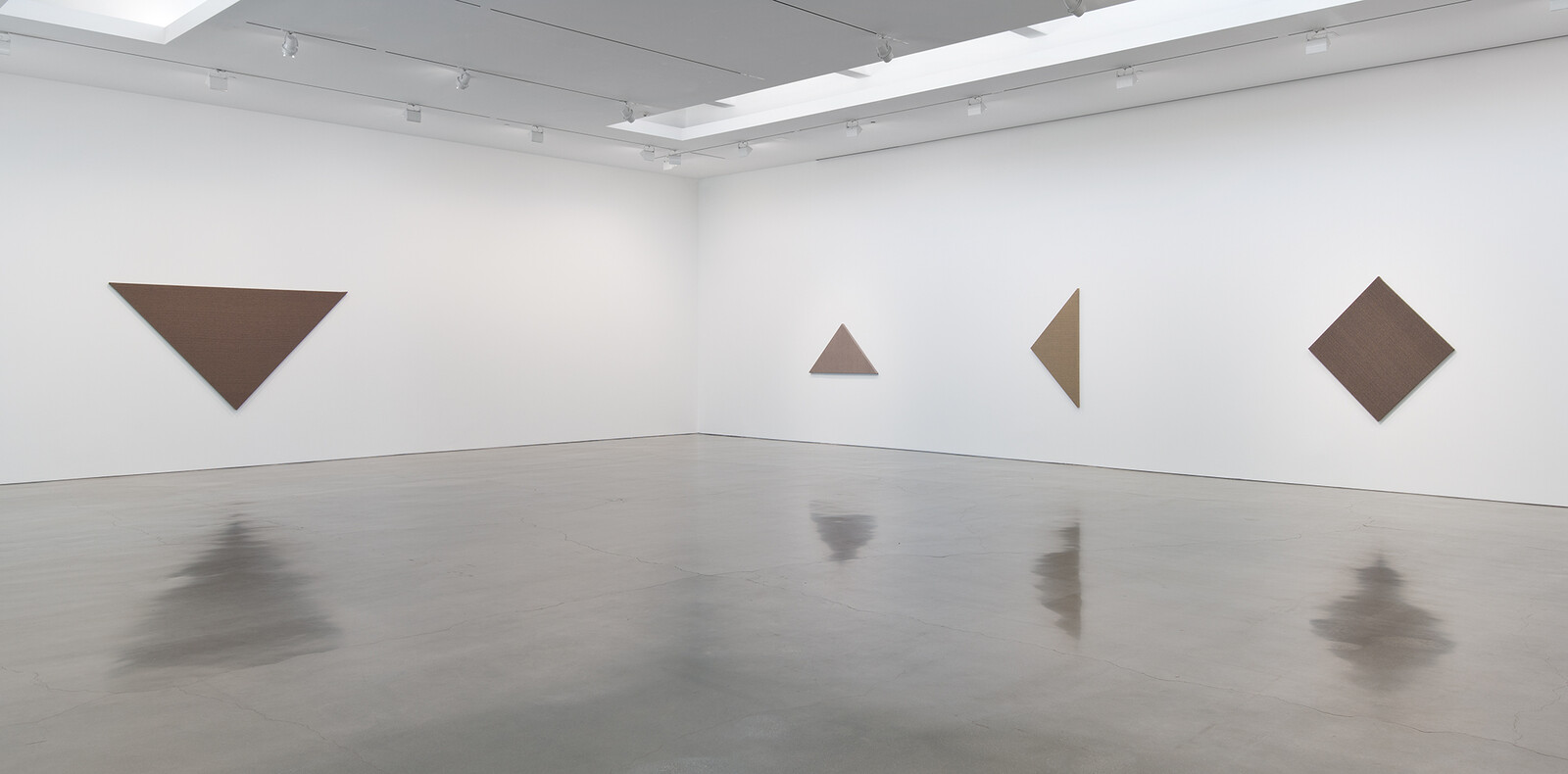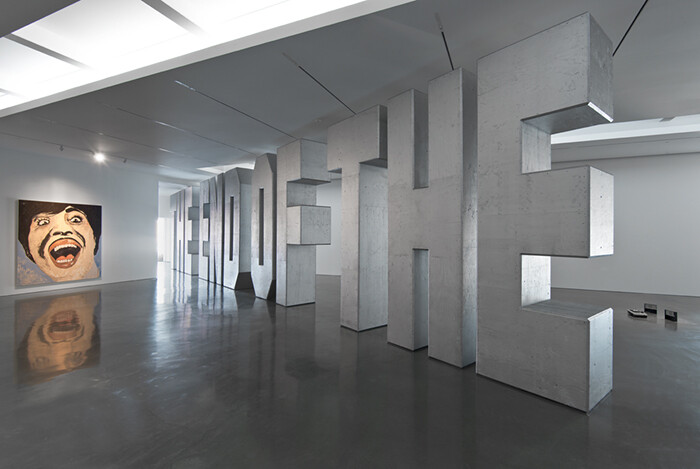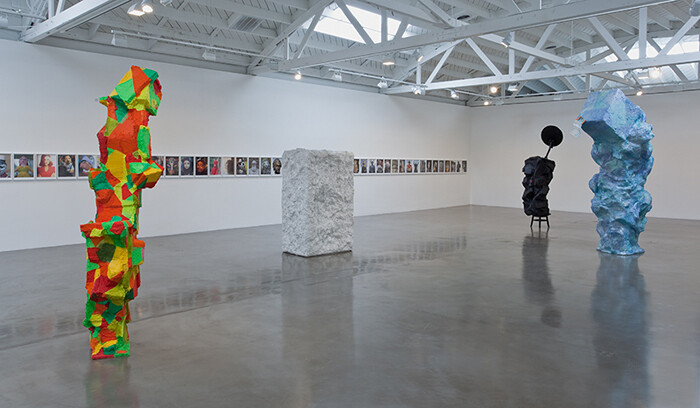Categories
Subjects
Authors
Artists
Venues
Locations
Calendar
Filter
Done
July 31, 2015 – Review
Willem de Rooij’s “Legal Noses”
Jennifer Piejko

Brown is a composite color, made by combining complementary hues—a warm neutral. It’s only itself when contrasted with a brighter shade; fuschia or aqua always appear so, while brown is brown only in comparison to another color; its visibility is dependent on the color next to it. Over centuries, brown’s association has changed from one with poverty and drab rusticity to virtue and wholesomeness—softly wrinkled brown paper bags for simple school lunches; the conscientious consumer opting for brown rice or sugar or toast over white; unrefined, unbleached napkins.
Beige. Elegant and dispassionate, beige has the warmth of brown and the coolness of white, and, like brown, is often dull—a background shade. Another chameleon, its perception is mediated by what’s adjacent; its temperature is unstable.
The seven wall works in Willem de Rooij’s new exhibition are each one part of a tangram, a simple Chinese puzzle in which this family of shapes come together to form a rectangle, or one of 6,500 other possible outcomes. First marketed in Germany in the late nineteenth century, they were often carved from stones or imitation earthenware, similar to the color scheme here. Each piece, or tan, is a shape of stretched fabric enlarged to several feet …
February 13, 2013 – Review
Jack Pierson’s “The End of the World”
Kevin McGarry

“You gotta love Jack Pierson” begins the flagrantly winking press release the artist wrote for his latest solo show, “The End of the World” at Regen Projects’s new palatial quarters located squarely in Hollywood, California. A literary effort, the statement morphs the typical promotional details of an artist bio into entertainment business buzz: previous exhibitions are described as “comeback attempts,” relationships with large galleries as “big budget studio roles.” Pierson’s rise to commercial success and (having out-earned contemporaries like “It-girl Nan Goldin”) his subsequent expulsion from the upper echelons of art discourse—the gatekeepers of which he refers to as the International Cultural Elite (ICE)—are chronicled here with a well-reasoned paranoia.
He claims, paradoxically, in the third person, that the artist is “oblivious to the fact that museums and art journals had long since slammed the door in his face,” concisely outlining his critical dilemma with the following: “his early downtrodden exercises in blitheness seemed to speak so lyrically about lost youth, AIDS, and Beauty that we became blind as his overpowering self obsession morphed into a topiary of empty cultural signifiers.”
Self-deprecating and clever, that summary may ring true to many. The truth is, of course, you don’t gotta love Jack Pierson, …
November 18, 2011 – Review
Raymond Pettibon’s "Desire in Pursuyt of the Whole"
Andrew Berardini

All the gang is here. An open-mouthed munchkin, mouth pitched back in roaring vavoom, the Reagan-headed claymation adventurer Gumby, weird scientists, weirder hippies, butch baseball players, and a gang of distant surfers sliding down the faces of pristine blue curls, most of it accompanied by the clipped noir narrative and untraceable quotations of Raymond Pettibon’s scattered story, the one he’s been writing for decades. Not every piece contains an old character though, and there’s even an unfamiliar stage: a clutch of collages occupy part of the exhibition, curled edges of layer after layer, old ads and celebrity snapshots, battered Valentines and newspaper clippings, but mostly just drawings layered on drawings, some stripped and simple, others spooky and complex, all of them an all-over-the-place mess.
But there’s something about looking at a new exhibition by Raymond Pettibon that is always like looking at an exhibition by Raymond Pettibon. In a first blushing witness of the work, the language, the voice was all there, and this last viewing finds the same: the pitched-punk anger balanced against something altogether fragile, heartbroken, and literary. The visual language is like that of a cartoon that’s wandered far from its comic book origins and found an oasis …
May 16, 2011 – Review
Walead Beshty’s "PROCESSCOLORFIELD" at Regen Projects II, Los Angeles
Tyler Coburn

There is little, in the conventional sense, to see in Walead Beshty’s first solo exhibition at Regen Projects. The vibrant, chromatic ribs of the Black Curl series, for example, derive from chance effects of colored light on photographic paper. A separate set of light jet prints, in shallow, plexi boxes, assume the scale and look of the curl series, yet comprise scans of similar pieces from Beshty’s 2011 Natural Histories catalog. As the artist has extensively theorized, such works serve to politically rearticulate the medium, focusing less on the photographic image, its absent referent, and the melancholic, psychical matter that spans the gap. Beshty’s photographs do reveal their indices, though the images are neither windows nor mirrors but flat, concrete parts that coextend with the industrial, economic, and social conditions of their making.(a)
“I try to embrace all the outcomes of the work [and] not repress any of it,” Beshty once remarked to Bob Nickas. The evidence takes form in the shredded and mulched composites of the artist’s “failed or ‘unshowable’” works, as well as Damiani Editore’s test prints of Beshty’s Selected Correspondences 2001-2010 catalog.(b) The publisher’s economical methods yield one of the exhibition’s more amusing sights, as Beshty’s photographs of …
June 14, 2010 – Review
Rachel Harrison’s "Asdfjkl;" at Regen Projects, LA
Sarah Lehrer-Graiwer

Everything lilts and tilts in Rachel Harrison’s upright totems. Boxy facets jut out at every angle and swollen protrusions bulge all over the rough, peaked, and slathered stucco-like surfaces. Her piecemeal monoliths totter drunkenly in a barely-balanced equilibrium of unstable, crudely Cubistic passages. Their scale and verticality loosely suggest the figure: short, stocky ones and tall, skinny dancing ones. The five new sculptures at Regen Projects II appear like characters with increasingly distinct personalities when considered against the continuous frieze (spanning the far wall of the gallery) of fifty-one photographs of various masks, portrait busts, figurines, and dolls that constitutes the third and most recent installment of Harrison’s Voyage of the Beagle, Three (2008-2010). (The title is taken from Darwin’s eponymous study, implying a cataloguing of visual culture).
The artist’s sometime habit of naming her constructions with famous proper names—as she does here with one brightly hued, amped up and coked out Pablo Escobar patterned like a tropical harlequin and hung with a matching cluster of glossy yellow, red, orange, and green fake chilies—further invites an anthropomorphizing projection of personality onto dumb and mute material heft. A simulated cartoon humanity convulses the sculptures’ bulky forms.
As a group, they are an absurd, …